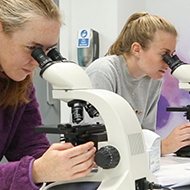Applications open for new BSAVA Research Fellowship

"BSAVA PetSavers aims to help these researchers reach their potential and in so doing expand the capacity or companion animal research in the UK" - David Killick.
Applications are now open for BSAVA PetSaver's new Research Fellowship, with a grant of up to £35,000 for two years' work in companion animal research.
Qualified veterinary professionals (vet surgeons and RVNs) are invited to apply for the Grant, which aims to support Early Careers Researchers immediately after gaining a postgraduate research qualification.
Applicants must have completed either a PhD or Masters and should be within their first four years of starting an academic post. Candidates must not have also received any more than £50,000 in funding in competitive external grants.
David Killick, chair of the BSAVA PetSavers Grants Awarding Committee, said: “BSAVA PetSavers is delighted to launch the PetSavers Research Fellowship. It is well recognised that the journey from completion of a PhD to becoming established as an independent researcher is one of the most challenging times of a researcher career.
“With this new grant, BSAVA PetSavers will support exceptional veterinary professionals in the Early Career Researcher phase develop their research ideas by providing £35,000 towards research costs over a two-year period.
He added: "Through this initiative, BSAVA PetSavers aims to help these researchers reach their potential and in so doing expand the capacity for companion animal research in the UK.”
Applications will remain open until 28 February 2022, with the decision reached by the end of May 2022. For more information and to apply, visit petsavers.org.uk



 The Veterinary Medicines Directorate (VMD) is inviting applications from veterinary students to attend a one-week extramural studies (EMS) placement in July 2026.
The Veterinary Medicines Directorate (VMD) is inviting applications from veterinary students to attend a one-week extramural studies (EMS) placement in July 2026.